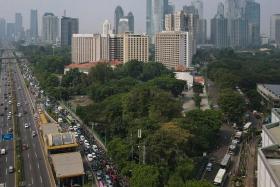Trust needed to ensure our resilience
The role of civil society is crucial to Singapore's fight against terrorism
Terrorism per se is not an existential threat to Singapore.
Instead, it is the mindless knee-jerk reactions to it that is.
The Islamic State in Iraq and Syria (ISIS) is being rolled back on multiple fronts.
But there is no doubt the endgame is still some distance away. This is so even now that the US-backed Syrian Democratic Force have gained control of Raqqa, the de facto capital of ISIS.
That triumph, and the liberation of Marawi being freshly liberated by the Philippine military from ISIS-linked fighters, do not signify the demise of terrorism - far from it.
With ISIS no longer having control of any significant territory it can call its own, it will revert to a clandestine terrorist organisation.
ISIS will start adopting a different strategy - attacks will be more ad hoc and spontaneous.
Online radicalisation efforts will take on greater importance as ISIS seeks to maintain its influence. It has also made known its intention to expand in South-east Asia, which is home to militant groups such as Jemaah Islamiyah and Abu Sayyaf.
It means terrorism will remain a real threat for many years to come.
Hence, confidence-building and trust are needed to ensure Singapore and Singaporeans build its stock of adequate social capital and resilience to withstand threats to its social fabric.
As no counter-radicalisation strategy would ensure no sign-ups to violent extremism, any expectation of a risk-free society in the terrorism context is misplaced.
Absolute security is not achievable, and policymakers must be frank about that.
Singaporeans and the authorities should recognise that religion and the security of the state, government, society and individual are intimately interlinked.
It is vital to protect religious freedom as a fundamental right, especially when faith is integral to the identity and values system of many Singaporeans.
In turn, trust and confidence are building blocks for a cohesive society requiring top-down and bottom-up commitment as well as action. Trust and confidence cannot be "taught", they are "caught".
Urgency should be accorded to establishing meaningful platforms for continual engagement, understanding, open-minded dialogue and trust-building between the state and faith communities, and among the faith communities.
Even as national security comes under threat, the better approach is to ensure the citizens' religious identities remain secure.
This approach also entails that civil society play a bigger role in ensuring the state and religion are both secure.
Put simply, looking at religion merely as a security threat is manifestly inadequate in keeping both state and society safe.
The role of civil society is crucial. Civil society can be meaningfully inducted to enhance a society's capacity to deal with the harm, and infuse legitimacy and secure confidence in the measures taken.
Societies like Singapore need to calibrate their responses to terrorism and the threats in a manner that balances vigilance and surveillance, resilience and paranoia,and avoids a Big Brother-like state characterised by fear, suspicion, and doubt.
The writer is an associate professor of law at the Singapore Management University School of Law.
Get The New Paper on your phone with the free TNP app. Download from the Apple App Store or Google Play Store now


